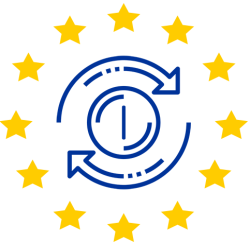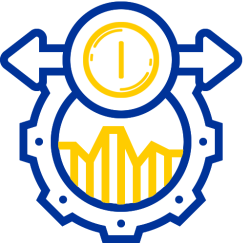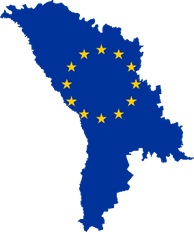| European integration stands as both a fundamental priority and a strategic objective within the internal and external policies of the Republic of Moldova and its Government. Beyond its policy value, it is essential for reinforcing the political and social cohesion of Moldovan society. |
|---|
In its designated areas of responsibility, the Ministry of Finance operates in alignment with the Association Agenda between the European Union (EU) and the Republic of Moldova (RM, It plays a central role in implementing the Association Agreement between Moldova and the EU, focusing on critical/ key areas that include::
- Combating illegal drug trafficking;
- Preventing money laundering and financing terrorism;
- Enhancing company law, accounting standards, auditing practices, and corporate governance;
- Regulating the financial sector;
- Strengthening public finance management through effective budget policy, internal controls, and financial inspections;
- Reforming taxation systems;
- Improving customs regulations and facilitating trade;
- Optimizing public procurement processes.
 In relation to the annual bilateral dialogue meetings between the Republic of Moldova and the European Union, as outlined in Article 439 of the RM-EU Association Agreement, the Ministry of Finance serves as the national institution responsible for organizing the Subcommittee on Economic Cooperation - Cluster I: ‘Economic dialogue, public finance management, statistics, financial services, control clauses and anti-fraud’.
In relation to the annual bilateral dialogue meetings between the Republic of Moldova and the European Union, as outlined in Article 439 of the RM-EU Association Agreement, the Ministry of Finance serves as the national institution responsible for organizing the Subcommittee on Economic Cooperation - Cluster I: ‘Economic dialogue, public finance management, statistics, financial services, control clauses and anti-fraud’.
 In the context of the Republic of Moldova’s preparation for the EU accession process, and in accordance with Government Decision No. 180/2024,’on the coordination mechanism for the accession Process of the Republic of Moldova to the European Union and the organization and operation of the negotiation team within this process’ ,the Ministry of Finance serves as the coordinating institution for::
In the context of the Republic of Moldova’s preparation for the EU accession process, and in accordance with Government Decision No. 180/2024,’on the coordination mechanism for the accession Process of the Republic of Moldova to the European Union and the organization and operation of the negotiation team within this process’ ,the Ministry of Finance serves as the coordinating institution for::
- The Committee for Cluster 3: ‘Competitiveness and Inclusive Growth’ which includes:
- Chapter 10: Information Society and Mass Media
- Chapter 16: Taxation
- Chapter 17: Economic and Monetary Policy
- Chapter 19: Social and Labor Policy
- Chapter 20: Industrial and Entrepreneurial Policy
- Chapter 25: Science and Research
- Chapter 26: Education and Culture
- Chapter 29: Customs Union
and for:
- The working group responsible for public finance management;
- The working group responsible for Chapter 4: Free Movement of Capital;
- The working group responsible for Chapter 5: Public Procurement;
- The working group responsible for Chapter 9: Financial Services;
- The working group responsible for Chapter 16: Taxation;
- The working group responsible for Chapter 17: Economic and Monetary Policy;
- The working group responsible for Chapter 29: Customs Union;
- The working group responsible for Chapter 32: Financial Control;
- The working group responsible for Chapter 33: Financial and Budgetary Provisions.
 The Directorate of European Integration and Cross-Border Cooperation is a division within the Ministry of Finance responsible for coordinating the European integration process. It oversees the working groups in which ministry representatives participate, ensuring the effective implementation of the Coordination Mechanism.
The Directorate of European Integration and Cross-Border Cooperation is a division within the Ministry of Finance responsible for coordinating the European integration process. It oversees the working groups in which ministry representatives participate, ensuring the effective implementation of the Coordination Mechanism.
 For further details on its history, please refer to: Brief history.
For further details on its history, please refer to: Brief history.












